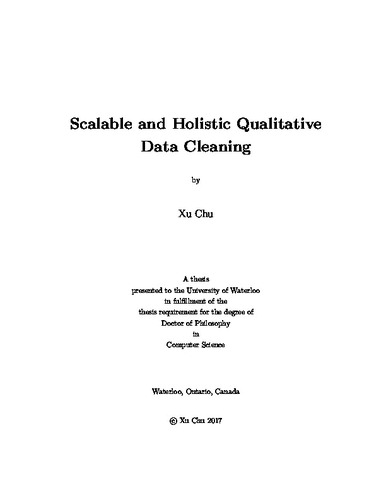| dc.description.abstract | Data quality is one of the most important problems in data management, since dirty data often leads to inaccurate data analytics results and wrong business decisions. Poor data across businesses and the government cost the U.S. economy 3.1 trillion a year, according to a report by InsightSquared in 2012. Data scientists reportedly spend 60% of their time in cleaning and organizing the data according to a survey published in Forbes in 2016. Therefore, we need effective and efficient techniques to reduce the human efforts in data cleaning.
Data cleaning activities usually consist of two phases: error detection and error repair. Error detection techniques can be generally classified as either quantitative or qualitative. Quantitative error detection techniques often involve statistical and machine learning methods to identify abnormal behaviors and errors. Quantitative error detection techniques have been mostly studied in the context of outlier detection. On the other hand, qualitative error detection techniques rely on descriptive approaches to specify patterns or constraints of a legal data instance. One common way of specifying those patterns or constraints is by using data quality rules expressed in some integrity constraint languages; and errors are captured by identifying violations of the specified rules. This dissertation focuses on tackling the challenges associated with detecting and repairing qualitative errors.
To clean a dirty dataset using rule-based qualitative data cleaning techniques, we first need to design data quality rules that reflect the semantics of the data. Since obtaining data quality rules by consulting domain experts is usually a time-consuming processing, we need automatic techniques to discover them. We show how to mine data quality rules expressed in the formalism of denial constraints (DCs). We choose DCs as the formal integrity constraint language for capturing data quality rules because it is able to capture many real-life data quality rules, and at the same time, it allows for efficient discovery algorithm.
Since error detection often requires a tuple pairwise comparison, a quadratic complexity that is expensive for a large dataset, we present a distribution strategy that distributes the error detection workload to a cluster of machines in a parallel shared-nothing computing environment. Our proposed distribution strategy aims at minimizing, across all machines, the maximum computation cost and the maximum communication cost, which are the two main types of cost one needs to consider in a shared-nothing environment.
In repairing qualitative errors, we propose a holistic data cleaning technique, which accumulates evidences from a broad spectrum of data quality rules, and suggests possible data updates in a holistic manner. Compared with previous piece-meal data repairing approaches, the holistic approach produces data updates with higher accuracy because it realizes the interactions between different errors using one representation, and aims at generating data updates that can fix as many errors as possible. | en |

